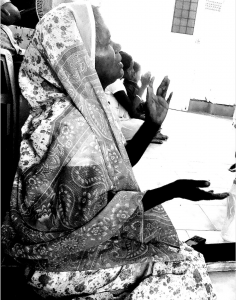The floor tiles are cool against my bare feet, and the fans are all blowing at full blast, making my headscarf billow at my shoulders. I’m perched on a futon frame with a piece of plywood for a seat, hopelessly trying not to stand out among the sea of ladies wrapped in saris, sitting on the floor before me. The pastor at the front of the room paces and speaks passionately into his microphone, and everyone in the room (besides the four Americans) responds with shouts of “Hallelujah!”
 This is a typical Sunday worship service in the village. The fervor builds as the pastor continues, and though I can’t understand any of the words being said, it’s clear when he calls his congregants to join him in prayer. Men and women of all ages and physical abilities move to their knees, with hands lifted, and begin crying out to the Lord. They echo some of the phrases the pastor says. They sway back and forth as they kneel. They reach their hands higher. And after minutes of intercession in this fashion, they break out in song. The melody is distinctly eastern, and the church members clap along as they lift their voices louder and louder.
This is a typical Sunday worship service in the village. The fervor builds as the pastor continues, and though I can’t understand any of the words being said, it’s clear when he calls his congregants to join him in prayer. Men and women of all ages and physical abilities move to their knees, with hands lifted, and begin crying out to the Lord. They echo some of the phrases the pastor says. They sway back and forth as they kneel. They reach their hands higher. And after minutes of intercession in this fashion, they break out in song. The melody is distinctly eastern, and the church members clap along as they lift their voices louder and louder.
I don’t speak a word of Tamil, but the passion and love and redemption are undeniably evident in this room. Their worship is dynamic and charismatic, as is their love for Christ. Our host tells us that their fervor for the Lord comes after being so oppressed by demonic forces for so long in their village. Now, though, there is light and hope and freedom in their worship. I’m reminded all over again what a joy it is to worship alongside brothers and sisters around the world – our styles and language and histories may all be very different, but our futures are the same. We are each held and sustained by the same gracious God, the One True God, and no matter what language we share it in, it’s a beautiful message.
